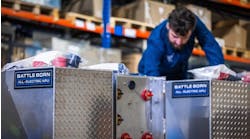By now everyone has heard about the new proposed EPA Phase 2 Greenhouse Gas Emissions standards. They set fuel efficiency regulations for commercial vehicles through the 2020s and are a joint rulemaking of the EPA and NHTSA. And there has been lots of talk about whether it goes far enough (environmentalists) or whether the fuel economy savings the trucking industry will achieve will offset the predicted cost of the technology.
Until engine and truck makers develop the needed technology and fleets deploy it, we really won’t be able to answer that question. And with Phase 1 happening in 2014 and again in 2017 and this new round affecting trucks and trailers built all the way out to 2030, there will be many technologies coming to deploy and evaluate.
As you know by now, I have strong opinions on the need for improved fuel efficiency, many of which I have shared in the now over 50 installments of this IdeaXchange forum. And specifically I will give you my take on what the new GHG emissions are going to mean to fleets when I speak at Fleet Owner’s upcoming webinar, Greenhouse Gas Emissions and Your Fleet.
Joining me that day will be Matthew Spears, center director, Heavy-duty Standards at the Environmental Protection Agency. I am sure he will have insightful things to share about the new standards and how they will deliver savings for fleets while slashing the emissions from commercial vehicles.
The webinar is Wednesday, Sept. 23 at 2 p.m. ET. You can still register for the event, which is sponsored by Ryder. Ryder has long been a proponent of improving fuel economy and is a big supporter of the work we are doing at NACFE and Trucking Efficiency.
There’s been much talk about whether we need regulations for efficiency when the natural business environment should create a climate for adoption of any technology that is economically practical. Particularly for fleet owners who run businesses and count every dime. But, like it or not the GHG standards are a reality and are here to stay and is another encouragement to save fuel and reduce our demand on petroleum. It’s up to manufacturers to try to make the technology solution as affordable, reliable and durable as possible. But it is up to all of us to make the process of adopting these technologies easy as well. You can help by openly sharing all the benefits and tradeoffs of your products, disclosing helpful data to a broader audience and using NACFE and Trucking Efficiency to tell your story and relay best practices of adoption. All of this, to make sure we are making the fuel we do use go as far as possible.
Sign up for the Webinar, Matt and I look forward to talking with you on the 23rd.



